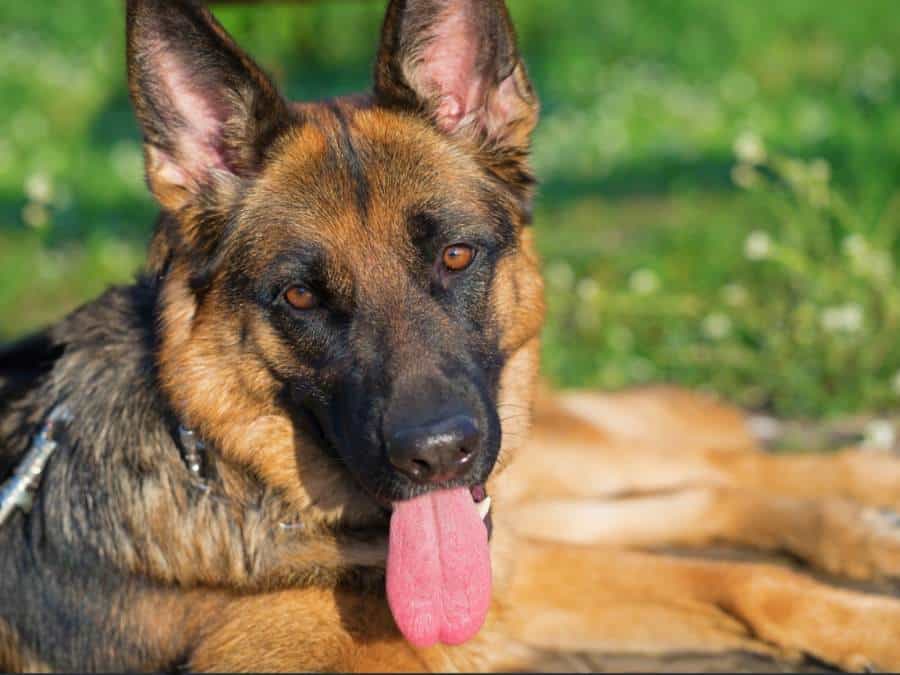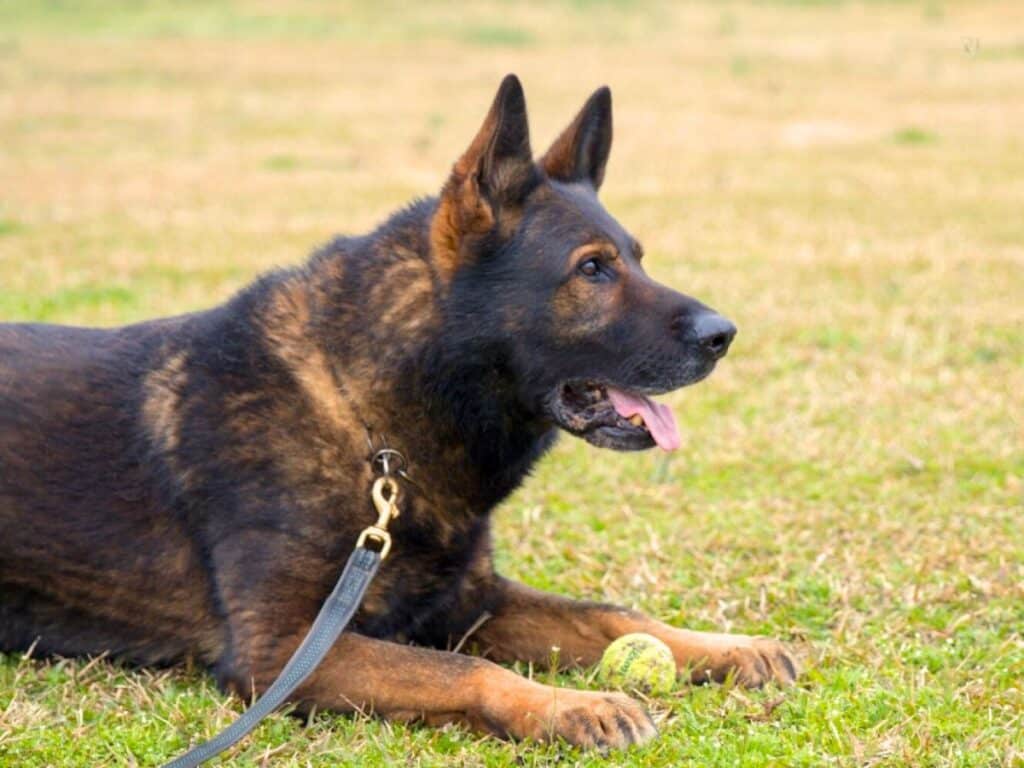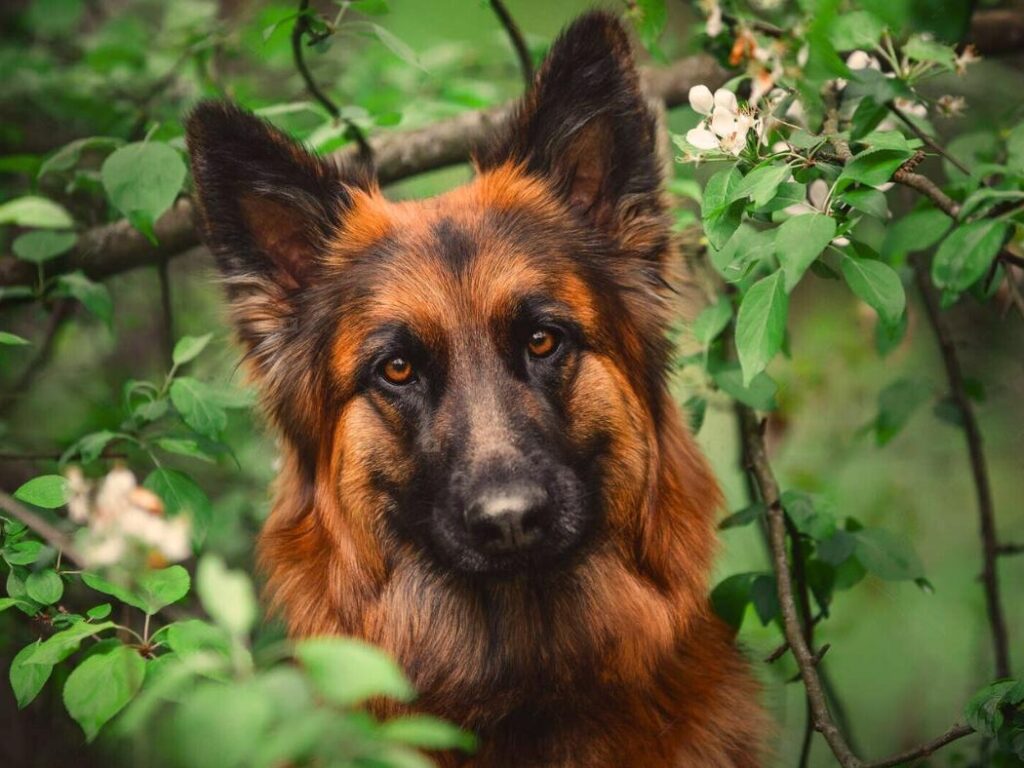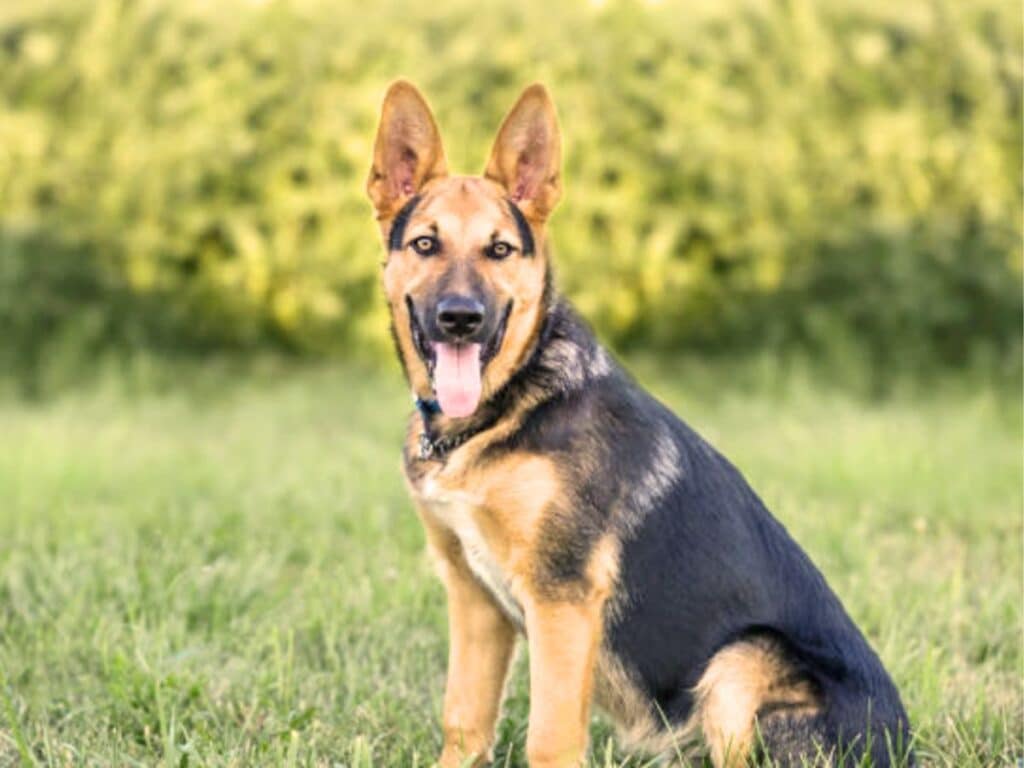Understanding the drooling habits of German Shepherds is crucial before bringing one into your home. While some dogs may have a reputation for profuse drooling, it can vary from dog to dog, even within the same breed.
Their coats are stunning, their behavior is remarkable, and their loyalty knows no bounds. However, dealing with excessive drooling can be a concern for some owners. If you’re considering adding a GSD to your family or already have one and want to understand why they drool so much saliva, this post will help shed light on the matter.
Do German Shepherds drool?
German Shepherds are not known for excessive drooling compared to some other breeds like Bulldogs or Saint Bernards, which are notorious for their drooling tendencies. However, some GSDs may drool occasionally, especially if they are excited or anticipating food, but it’s generally not a characteristic trait of the breed.
Factors such as genetics, age, and health can also influence the amount of drool a dog produces. If you’re concerned about excessive drooling in your German Shepherd, it’s a good idea to consult with a veterinarian to rule out any underlying health issues.
Common Reasons for German Shepherd’s Drooling
If you’re wondering why your furry friend leaves a trail of saliva everywhere they go, well there can be several possible harmless and major health reasons to consider.
First, let’s explore the most common harmless causes of drooling in German Shepherds.
1. The dog may be expecting a meal

Dogs have a highly developed sense of smell and taste, and they can associate specific scents and routines with food. When a German Shepherd anticipates a mealtime, they might start to drool in response to the aroma of the food being prepared or the sound of food being handled.
This is because their body prepares for digestion, and saliva production increases in anticipation of eating.
2. Exercise & Overheating
Just like humans, dogs sweat as a way to regulate their body temperature. However, unlike us, dogs primarily cool themselves down through panting rather than sweating.
In hot weather or during intense exercise, German Shepherds may produce more saliva as their bodies try to cool down. This increased salivation can result in noticeable drooling.
3. They may be overly excited
When a German Shepherd becomes overly excited, it can trigger increased salivation as part of the dog’s physiological response to excitement.
This occurs because excitement activates the sympathetic nervous system, which, among other things, stimulates the salivary glands, leading to the production of more saliva.
Additionally, the dog’s mouth movements, such as panting, barking, or vocalizations, during moments of high excitement can further contribute to the accumulation of saliva, potentially resulting in drooling.
4. The dog may have just drank water
Some dogs might drool slightly while drinking because they may not have perfect control over their saliva glands during this activity.
As they lap up water, especially if they’re drinking quickly or enthusiastically, some water may spill or dribble from their mouths, causing a minor increase in saliva.
Major Health Reasons for German Shepherd’s Drooling
1. They are anxious or stressed

When a dog feels anxious or stressed, their body may respond by producing more saliva. Common triggers for anxiety in German Shepherds include separation from their owners, loud noises like thunderstorms or fireworks, unfamiliar environments, or even changes in routine.
Identifying the underlying reasons behind your German Shepherd’s excessive drooling is essential for addressing the issue effectively.
Remember that while some drooling is normal for German Shepherds, excessive or sudden changes in drooling patterns should not be ignored.
RELATED: Common German Shepherd Health Issues
2. They might be nauseous
When a dog is nauseous, it can trigger excessive salivation and drooling. This happens because the body is preparing for potential vomiting or to get rid of something that might be causing the nausea.
The excess saliva helps to protect the throat and mouth from stomach acid or any irritants that may come up if the dog vomits.
Therefore, if you notice your German Shepherd drooling excessively and showing signs of nausea, such as retching or abdominal discomfort, it’s important to consult with a veterinarian to determine the underlying cause.
3. They may have ingested something toxic
Toxic substances often irritate the gastrointestinal tract, mouth, and throat, and this irritation triggers an increased production of saliva as a protective mechanism.
The excess saliva helps to dilute and neutralize the harmful substance, as well as to facilitate its removal from the body. This drooling is usually accompanied by other symptoms of toxicity, such as vomiting, diarrhea, lethargy, and in severe cases, seizures or difficulty breathing.
4. They may have anorexia
When a dog isn’t eating or has a reduced food intake, the stomach may become empty, which can stimulate excessive production of stomach acid.
This increased stomach acid can lead to irritation in the gastrointestinal tract, and the dog may drool in response to this irritation.
5. GSD may have a blocked salivary gland

Salivary glands produce saliva, which is essential for the process of digestion and maintaining oral health. When one of these glands becomes blocked, it can obstruct the flow of saliva, causing it to build up in the affected gland and potentially leading to drooling. (PetsWebMD)
The blockage can result from various factors, such as inflammation, infection, or the formation of a salivary gland stone (sialolith). The excess saliva can then leak out of the gland and accumulate in the mouth, causing drooling.
6. GSD may have an acute hemorrhagic gastroenteritis
Having acute hemorrhagic gastroenteritis (HGE) can potentially make a German Shepherd or any dog drool, but drooling is not typically a primary symptom of HGE.
HGE is a serious gastrointestinal condition characterized by severe vomiting and bloody diarrhea, often accompanied by abdominal pain, lethargy, and dehydration.
In the case of drooling, it might occur as a secondary response to the discomfort and distress associated with HGE. The severe abdominal pain, nausea, or stress from the illness could lead to increased salivation in an attempt to protect the mouth and throat or due to general discomfort.
7. They may have a stomach upset or bloat
Experiencing a stomach upset or bloat can make a German Shepherd or any dog drool due to the discomfort and physiological reactions associated with these conditions.
When a dog’s stomach is upset, it often leads to nausea and increased saliva production as a protective mechanism against potential vomiting or irritation. This heightened saliva production can result in noticeable drooling.
In the case of bloat, a critical and life-threatening condition where the stomach becomes distended and twisted, excessive drooling occurs due to the extreme pain and distress the dog experiences. Drooling in these situations is a clear sign of discomfort and stress, and immediate veterinary attention is crucial to diagnose and address the underlying issue.
RELATED: Bloating in German Shepherds: Symptoms & Treatment
8. They may have a dental issue
According to the American Kennel Club, Dental issues such as gum disease, tooth decay, fractured teeth, or oral infections can cause discomfort or pain when a dog tries to eat or even when their mouth is at rest.
This discomfort triggers the body’s natural response to produce more saliva as a protective mechanism. The excess saliva can then accumulate in the mouth and may lead to noticeable drooling.
9. They may have an allergic reaction

Allergic reactions often involve inflammation and irritation of various body systems, including the oral mucosa.
When a dog comes into contact with an allergen they are sensitive to, it can trigger an inflammatory response in the mouth and throat, leading to increased saliva production as a protective mechanism.
The excess saliva helps to clear the irritants from the mouth and soothe any discomfort. Therefore, drooling can be one of the symptoms of an allergic reaction, which may also include itching, skin problems, gastrointestinal issues, and respiratory difficulties.
10. They may have motion sickness
Motion sickness occurs when there is a disconnect between the dog’s inner ear (which controls balance) and the visual input they receive during car rides or other forms of motion. This sensory mismatch can lead to nausea and, as a result, increased salivation or drooling.
The body’s natural response to nausea is to produce more saliva, which can help soothe the stomach and protect the mouth and throat from potential irritants.
Also Read:
How to Reduce Your German Shepherd’s Drooling?
Reducing your German Shepherd’s drooling can be challenging, as it’s often a natural response to various stimuli, including excitement, anticipation of food, or certain medical conditions. However, there are some steps you can take to minimize drooling in your German Shepherd:
1. Regular dental care
Ensure your dog’s dental health is in good condition by brushing their teeth regularly and providing dental chews or toys. Dental issues can lead to excessive drooling.

2. Proper feeding
Providing a balanced diet with appropriate food choices can help reduce excessive salivation. Opt for high-quality dog food that contains natural ingredients without any artificial additives or fillers. Avoid foods that are known to trigger excessive drooling in dogs, such as spicy or greasy human foods.
3. Avoid excitement triggers
Minimize situations that overly excite your dog, as excessive excitement can lead to drooling. Training and socialization can help your dog become more accustomed to various situations.
4. Keep them hydrated
Make sure your dog has access to clean, fresh water at all times. Adequate hydration can help maintain normal saliva production.
5. Address medical issues
If you notice sudden or persistent drooling that is not associated with normal circumstances (like mealtime or excitement), consult with a veterinarian to rule out any underlying medical issues.
6. Manage stress & anxiety
Reducing stress and anxiety in your German Shepherd can help minimize drooling in stressful situations. Provide a calm and secure environment, and consider behavioral training if needed.
7. Carry a towel
If your German Shepherd tends to drool excessively during car rides or after drinking water, keep a towel handy to wipe their mouth.
8. Consult a vet
If drooling is a new or concerning behavior, or if it’s accompanied by other symptoms like vomiting or diarrhea, seek advice from a veterinarian to rule out any health issues.
Remember that some degree of drooling is normal for many dogs, and it can vary from one dog to another. While you can take steps to manage it, it’s important to understand and accept that it’s a natural behavior in some breeds, including German Shepherds.
Also Read:
Which dog breeds hardly ever drool?
Several dog breeds are known for their minimal drooling tendencies. While individual dogs within any breed can vary, these breeds are generally considered to be among the least drooly:
1. Poodle: Both Standard and Miniature Poodles are known for their low drooling propensity. Their curly, tight-fitting lips help keep saliva in check.
2. Basenji: This African breed is often referred to as the “barkless dog” and is not known for excessive drooling.
3. Boxer: Boxers are relatively low droolers compared to some other large breeds, thanks to their shorter muzzle.
4. Whippet: Whippets are a sighthound breed that typically doesn’t have a problem with drooling.
5. Shiba Inu: This Japanese breed is known for its cleanliness and rarely drools.
6. Bichon Frise: These small fluffy dogs are generally low droolers.
7. Doberman Pinscher: While they may drool occasionally, Dobermans tend to be relatively dry-mouthed for a larger breed.
8. Vizsla: Vizslas are known for their neat and tidy habits and are not prone to excessive drooling.
9. Irish Water Spaniel: Despite the word “spaniel” in their name, these dogs typically don’t drool much.
10. Australian Shepherd: Aussies usually have dry mouths and aren’t known for slobbering.
It’s important to note that while these breeds are less prone to drooling, individual dogs can still have variations in their drooling habits based on factors like genetics, health, and environment.
Conclusion
Now that you have a better understanding of why German Shepherds drool and how to reduce it, you can take proactive steps to manage this natural behavior. Remember, drooling is a normal part of being a German Shepherd, so don’t be too hard on your furry friend. Instead, focus on minimizing the inconvenience it may cause.
To help reduce your German Shepherd’s drooling, try implementing some of the tips we discussed earlier. Keep their dental health in check, provide them with appropriate chew toys, and ensure they have access to fresh water at all times. Consider using a drool bib or towel when necessary to protect your furniture or clothing.
By taking these simple measures, you can create a more comfortable environment for both you and your beloved German Shepherd.
FAQs
1. Can I completely stop my German Shepherd from drooling?
While you can take steps to minimize excessive drooling, completely stopping it may not be possible or advisable. Focus on managing the drooling rather than trying to eliminate it entirely.
2. Are there any medical conditions that could cause excessive drooling in my German Shepherd?
Yes, excessive drooling can sometimes be a sign of underlying health issues in dogs. If you notice a sudden increase in your German Shepherd’s drooling or if it seems abnormal compared to their usual behavior, it’s best to consult with your veterinarian. They will be able to assess your dog’s overall health and determine if further investigation is needed.
3. How often should I clean my German Shepherd’s mouth?
Regular dental care is essential for maintaining good oral hygiene in dogs. Aim to brush your German Shepherd’s teeth at least two to three times a week using a dog-specific toothbrush and toothpaste. Providing dental chews or toys can help keep their teeth clean and reduce the risk of dental issues that may contribute to excessive drooling.
4. Can diet affect my German Shepherd’s drooling?
Certain foods, especially those with strong flavors or high salt content, may stimulate saliva production. If you notice that specific foods trigger excessive drooling in your dog, consider adjusting their diet or consulting with a veterinarian for dietary recommendations.
5. Should I be concerned if my German Shepherd suddenly starts drooling excessively?
Sudden changes in drooling patterns could indicate an underlying health issue or discomfort. It’s best to consult with your veterinarian to rule out any potential problems and ensure your furry friend receives appropriate care.




